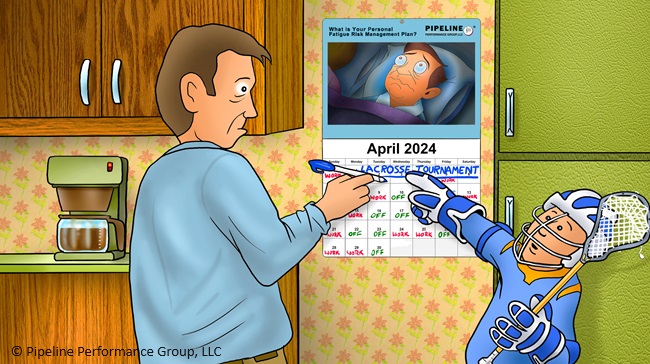We spend a lot of time learning about the various aspects of fatigue and sleep, but what do we do with what we learn? As with any other topic, we learn the content and then may or may not apply the lessons we learn. Making personal changes is especially hard! We may be advised to try one new thing at a time. Or we may be advised to do something new for 21 straight days for it to become a habit. (That’s a myth, by the way!) So, what can YOU do to apply all the valuable information you learn about fatigue?
A Fatigue Management Plan is a valuable tool. Your company likely has one which details their policies and practices around things like shift scheduling and work hour limits, to name a few. Managing fatigue, however, is a shared responsibility. Your company should do their part, and you must do yours.
For shiftworkers, the pressure of work hours, family obligations and personal well-being can create additional stress. While you might believe the simplest way to carve out more time for life’s responsibilities is to cut back on sleep, sleep deficit can have a detrimental impact on your ability to work safely and productively on the job, and to enjoy your off-duty hours.[1]
Creating a personal fatigue management plan can help you think through the areas that are particularly challenging for you and create action items and goals to help make productive changes to decrease your fatigue risk. Some items to consider include:
- Create a sleep calendar – A sleep calendar can help you stay on track with getting adequate sleep while also making the most of your personal and social time. Planning ahead and setting aside time to spend with family and friends is key to your well-being. If your family understands the importance of sleep in fighting your fatigue between shifts, they are more likely to support your needs.
- Get an annual physical – Has it been years since you were last at the doctor’s office? Schedule an annual physical! Many annual check-ups will include bloodwork and a review of your blood pressure, heart rate, weight and body mass index. All of this can help identify underlying medical conditions, even if you usually feel “fine.” An annual physical also provides a great opportunity for discussions with the doctor regarding sleep difficulties you might be experiencing.
- Plan meals and healthful snacks – Whether you plan meals and snacks weekly or daily, just make a plan! Your good food and drink choices become easier when you are prepared. Grabbing a small container of lean meats, fresh veggies and hummus from your bag is just as easy as hitting up the vending machine – and better for you too.
- Track sleep patterns – If you are experiencing restless sleep or are waking up tired, investing in a sleep tracker might be a good option. There are wearable sleep tracker options and apps as well. Using a sleep tracker for at least 90 consecutive days can monitor your sleep patterns which can then equip you with information to adjust your sleep routine or seek medical advice if necessary.
Whatever your choices for your personal fatigue management plan, think about what’s right for you and get started today! As your life circumstances change or as you reach goals, modify your plan so that you continue moving forward in your fatigue management journey.
[1] National Safety Council, Developing an Effective Fatigue Risk Management System, https://www.nsc.org/getmedia/e2f18939-f381-4fee-a1b4-8333c17c2619/managing-workplace-fatigue.pdf.aspx
MANAGING FATIGUE EDUCATIONAL PROGRAM
Christina Via © 2024 Please Distribute to Others.




